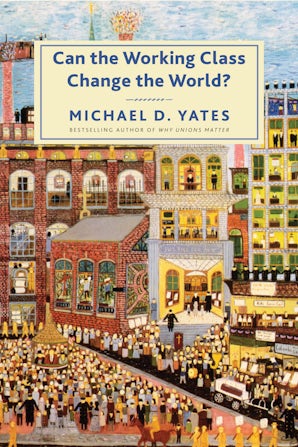Beyond enthusiasm for an imagined anti-capitalism (Los Angeles Review of Books reviews “Can the Working Class Change the World?”)

Can the Working Class Change the World?
218 pp, $19 pbk, ISBN 978-1-58367-710-0
By Michael D. Yates
Reviewed by Joshua Sperber
….Michael Yates’s Can the Working Class Change the World? uses Marx to describe capitalism’s historically unique emphasis on the unending accumulation of capital and its resulting human and environmental catastrophes. In Capital, Marx famously erected a hypothetical, ideally functioning capitalism freed from real world imperfections. By doing so, he demonstrated that, even in the best of circumstances, capitalism must always be exploitative and destructive since the foundation of capitalist growth is a social relationship in which capitalists take more from wage workers than they give back, thereby increasing wealth and power through an endless accumulation predicated on the immiseration of the working class….We will not save ourselves from Dracula by fining him for his excesses but by driving a stake through his heart.
….Yates, however, does not deny that significant advances have been made by left organizations. On the contrary, chapter four (“What Hath the Working Class Wrought”) recounts numerous, often dramatic, instances in which the working class has used unions and parties to improve daily life for regular people. Among other examples, Yates recounts Greg Shotwell’s depiction of how United Auto Workers members humbled a boorish foreman at a General Motors plant. Nevertheless, Yates is cognizant of the limitations of workers’ power within inherently defensive organizations. This lesson applies not only to unions and parties but also to left NGOs, whose commitment to organizational expansion and fundraising puts them in competition with like-minded organizations at the expense of shared goals. An organization that genuinely sought radical improvement would be devoted, above all, to revolution and ultimately self-negation. That they are instead devoted to institutionalization and self-promotion has meant that workers’ interests are repeatedly undercut not only from the bosses on the “outside” but also from the organizational leadership of self-described allies on the “inside.”
It is with this attentiveness to the historic shortcomings and duplicity of left organizations that Yates rejects so-called democratic socialism, which even in its heyday failed to fundamentally challenge capitalism. Setting our sights on the mere (and, as history shows, inevitably temporary) reform of a fundamentally exploitative system instead reflects a colossal failure of imagination akin to the prisoner who spends all his energy advocating for a larger window in his cell.
To be sure, we are frequently informed that organizations such as the Democratic Socialists of America have dramatically increased their membership over the last several years. Yet, considering the intensity of our enduring economic, social, and political miseries, it would be far more notable if general interest in socialism had not grown. The popularity of the DSA, as well as politicians such as Bernie Sanders and Alexandria Ocasio-Cortez, does not merely reveal a growing enthusiasm for an imagined anti-capitalism. Rather, the institutionalization of this emerging interest simultaneously excludes alternative, and more radical, organizational and theoretical developments — ones in which the goal is not a diluted anti-capitalism or the White House but actual human liberation.
You can read the full review at Los Angeles Review of Books


